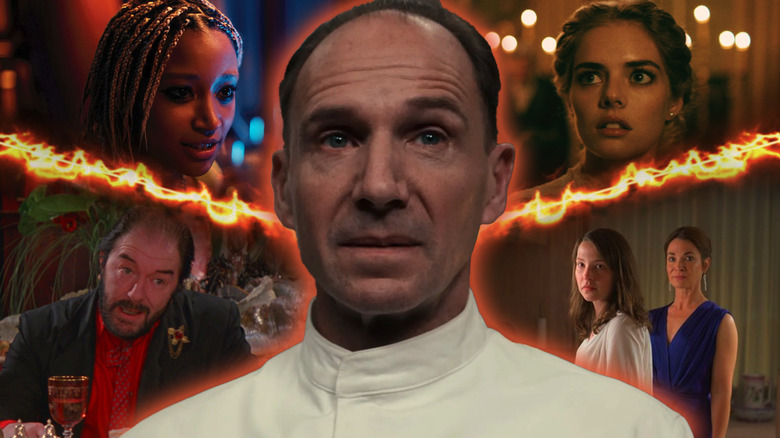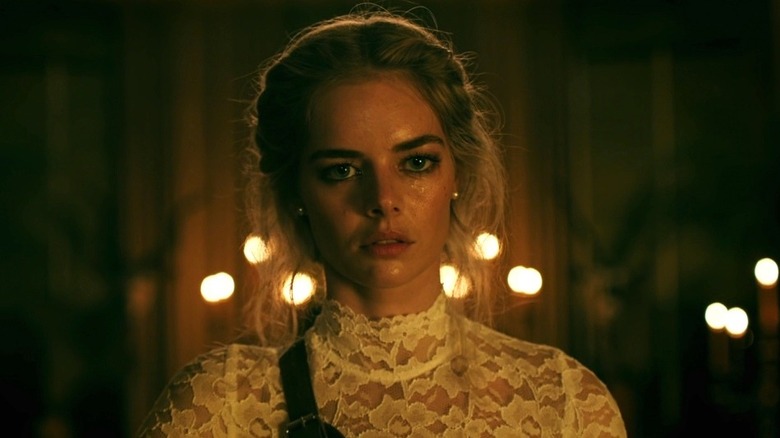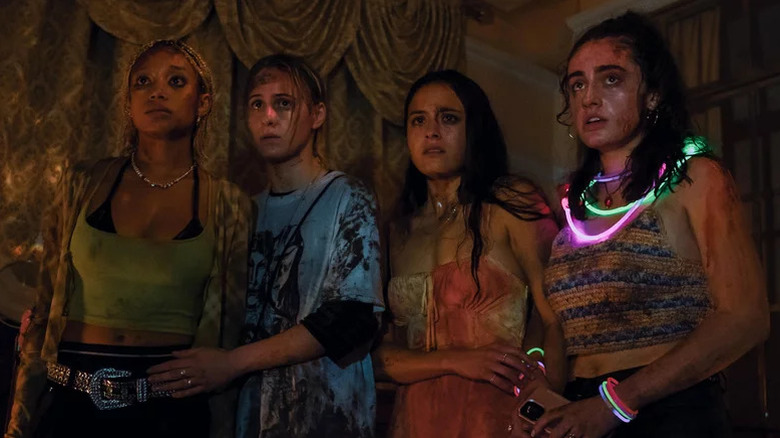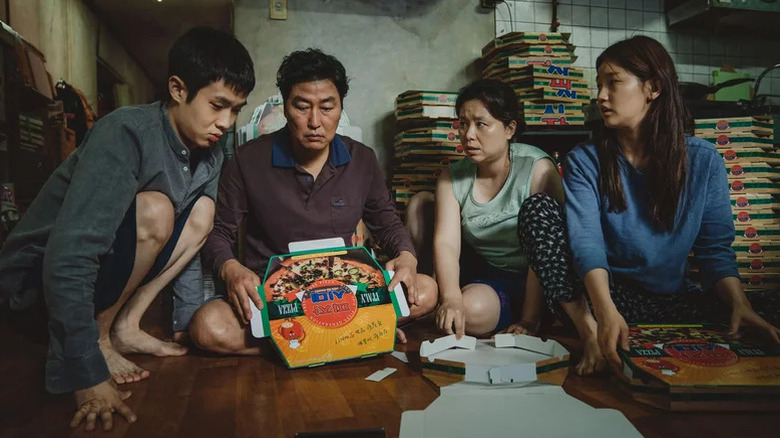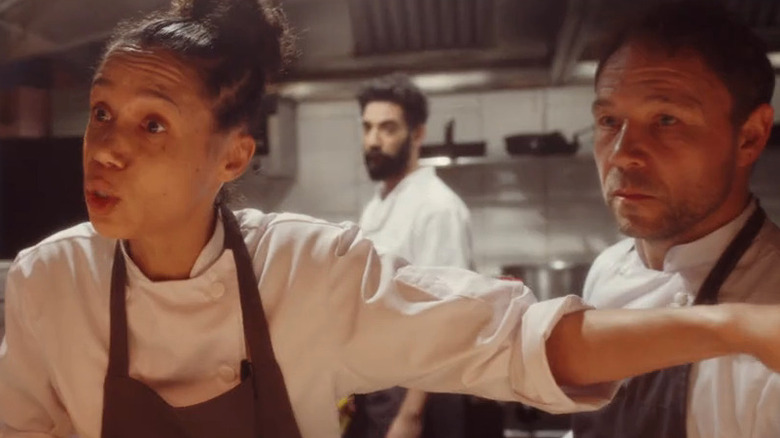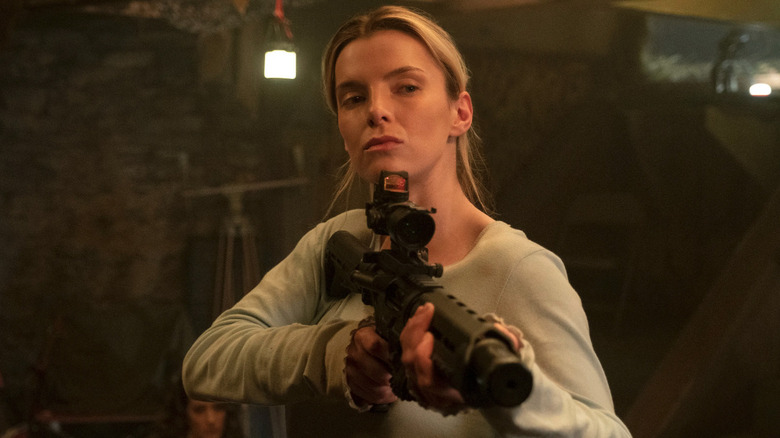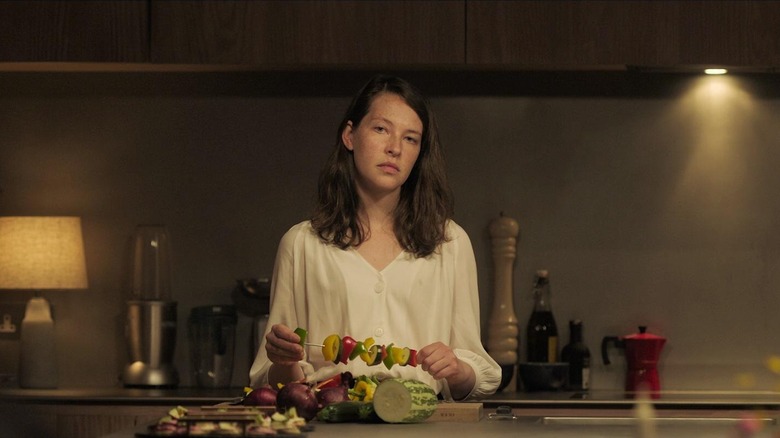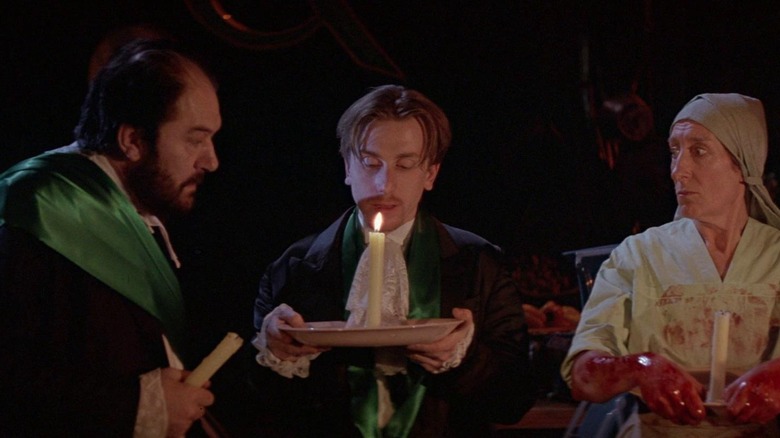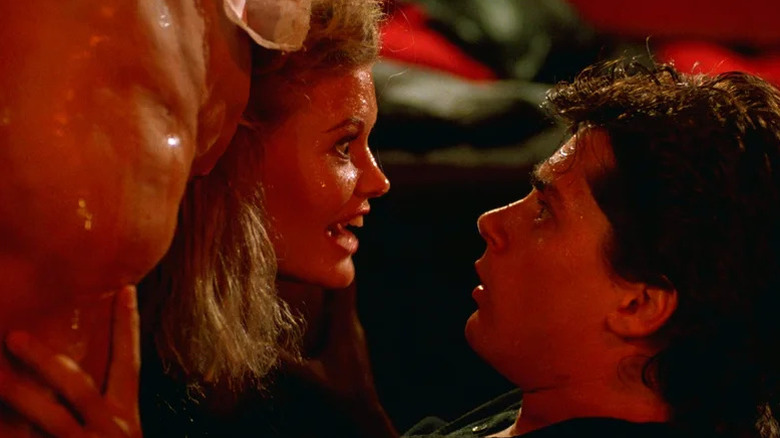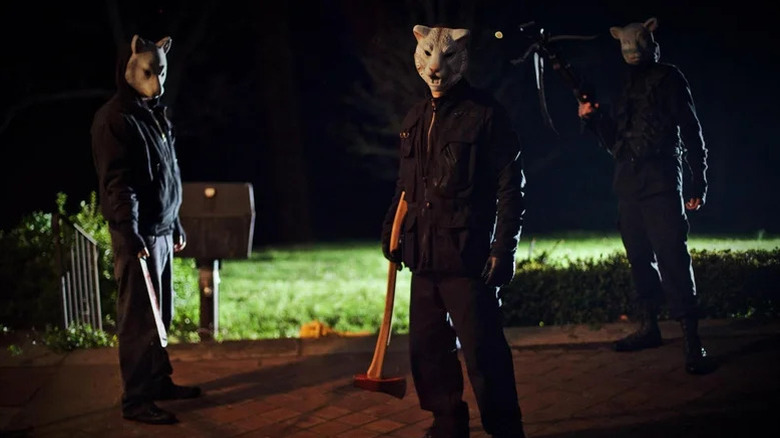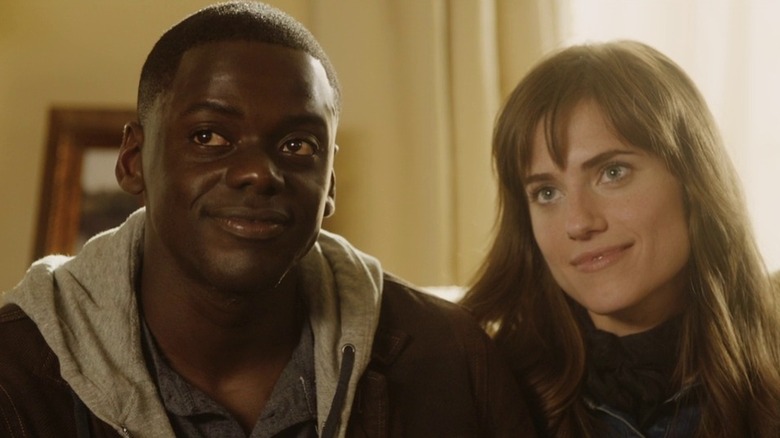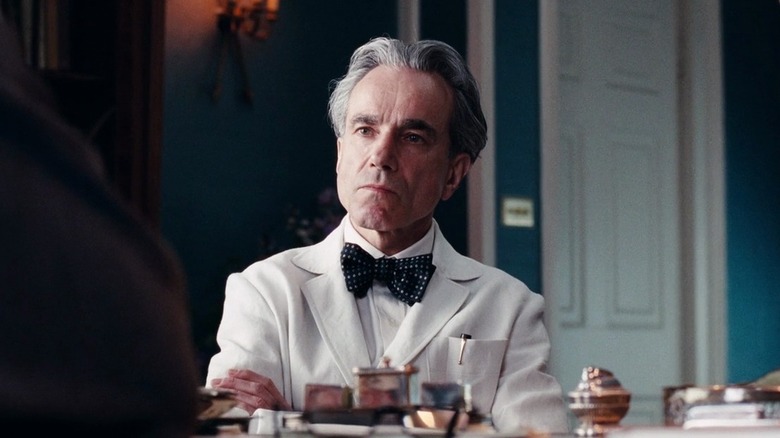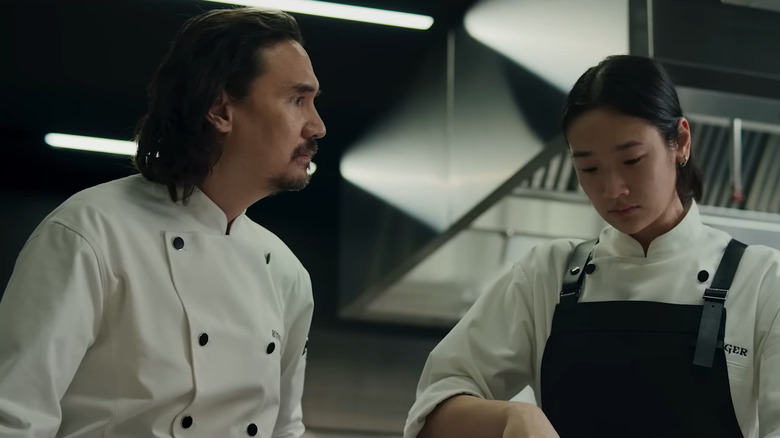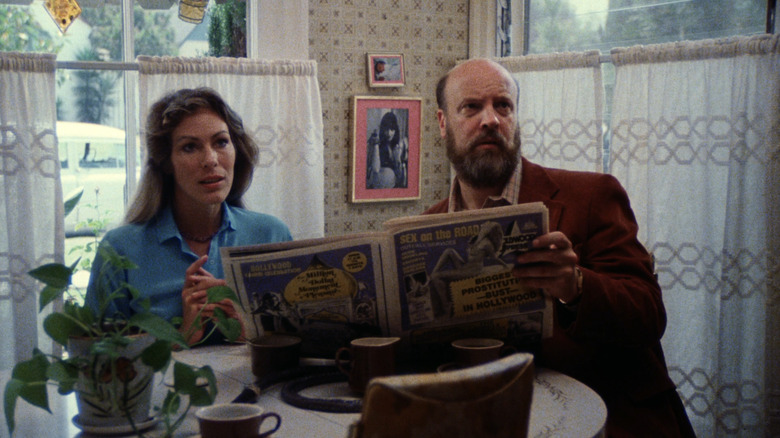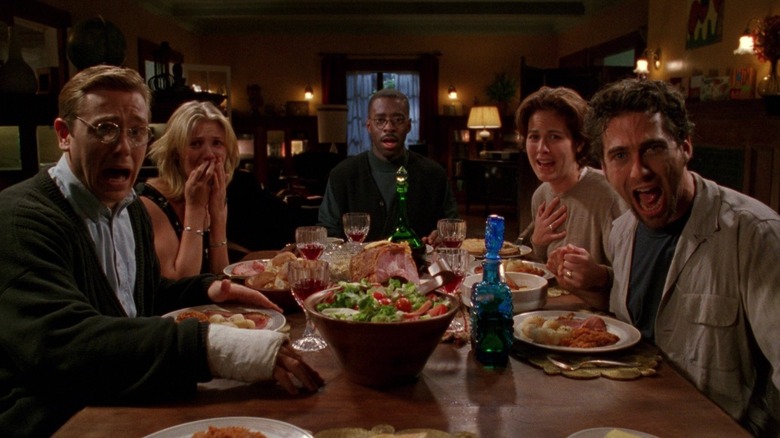15 Best Movies Like The Menu
Rich people are en vogue. Not in a literal sense, as more and more of the 99% have realized the extent of their bourgeois overlords' treachery, but within the realm of fiction. From "The White Lotus" to "Succession," horrible rich people populate some of our favorite television shows and films. In cinema, many films about wealthy people see these protagonists getting their comeuppance, a genre we might call "eat the rich" films.
"The Menu," a 2022 horror movie starring Anya Taylor-Joy, takes that conceit seriously. Joy plays a sex worker and the date of a wealthy foodie (Nicholas Hoult). They travel to a renowned restaurant run by an exacting chef (Ralph Fiennes), where the moneyed patrons become part of the meal. In a darkly comedic fashion, the film points out the prosperous culture of the wealthy, which only an outsider like Joy's character can see through.
If this tasty social commentary struck your fancy, you're in luck. We've compiled a list of films that share qualities with "The Menu," whether through their "eat the rich" mentality, an intense focus on food, or a keen eye for the cost of perfection.
Triangle of Sadness
As the most striking "eat the rich" film of the last decade, "Triangle of Sadness" doesn't pull any punches when it comes to hammering in social commentary. We begin by boarding a luxury cruise ship alongside a pair of young influencers, Yaya (Charlbi Dean) and Carl (Harris Dickinson). The ship's passengers are all snotty wealthy people used to getting their way. It comes as a surprise, then, when the ship encounters a storm and capsizes in the middle of the ocean. The passengers, along with a few staff, find themselves stranded on a desert island.
A flamboyant black comedy, "Triangle of Sadness" should come with a warning. If the expulsion of bodily fluids from various orifices makes you squeamish, you might want to skip this one. Indeed, the storm sequence on the ship is one of the most grotesque movie scenes in recent memory. But if you're strong enough to get through that, what you'll find is a clever class commentary that ends up in some unexpected places, just like "The Menu."
Ready or Not
In "The Menu," we root for Anya Taylor-Joy's character Margot because she's the antithesis of the terrible rich people she's dining with — but she's not the perfect archetype of a final girl either. In "Ready or Not," the outsider protagonist functions similarly. Helmed by "Scream" (2022) directors Matt Bettinelli-Olpin and Tyler Gillett, the movie follows Grace (Samara Weaving), the new bride of the wealthy Alex (Mark O'Brien). Grace's happy day turns into a nightmare when Alex's family picks up their weapons and begins hunting her down across their estate.
"Ready or Not" doesn't waste time with subtlety. Instead, it hits you over the head with the central metaphor about rich people taking what they want from others with no regard for their shared humanity. This blunt-force strategy works for the film because "Ready or Not" is a horror comedy that doesn't take itself too seriously. Indebted to classic Hollywood movies like "Clue" and "Gaslight," the movie's violent game of cat and mouse delivers thrills from start to finish. With a charming lead performance from Weaving, it's an underrated romp worth adding to your list.
Bodies Bodies Bodies
Locked-room mysteries make some of the best movie mysteries ever, and that's part of the reason why "Bodies Bodies Bodies" is so much fun. Like "The Menu," the film follows a group of privileged people who travel to a remote location where violence ensues. Halina Reijn's movie follows a gang of twentysomethings spending the weekend at a mansion. We meet rich stoner David (Pete Davidson) and his girlfriend Emma (Chase Sui Wonders), the jealous, competitive Jordan (Myha'la Herrold), Alice (Rachel Sennott), a vapid podcast host, and her older boyfriend Greg (Lee Pace), and outcast Sophie (Amandla Stenberg) and her mysterious girlfriend Bee (Maria Bakalova).
While they're playing a murder mystery game, the power goes out due to a hurricane, and real bodies start piling up. A mystery, a horror movie, and a comedy all at once, the film deftly navigates genre expectations, resulting in a satisfying enterprise that won't give you nightmares. In fact, it's more likely to inspire you to listen to Rachel Sennott's fake podcast, hilariously called "Hanging Out with Your Smartest, Funniest Friend."
Parasite
Korean director Bong Joon Ho uses his films to critique capitalism. From "Snowpiercer" to "Okja" to "Mickey 17," his movies tackle big concepts with a sharp wit. American audiences are most familiar with his Oscar-winning film "Parasite," a bloody, twisted, and hilarious morality tale. The 2019 movie follows two families living under very different circumstances. The Parks are a wealthy family, ignorant of the struggles of others. The Kim family is poor, and when their son gets a job at the Parks' house, they seize the opportunity for upward mobility. Ingratiating themselves into the Parks' lives through lies and deceit, the Kim family all get jobs at the house without revealing their true identities.
If you haven't seen the film, it's best not to investigate further before watching. Director Bong is a master of abrupt twists and tonal changes, and he subverts expectations beautifully in "Parasite." Thrilling, funny, shocking, and thought-provoking, the film will have you on the edge of your seat until the very end. If you enjoyed the tension and humor of "The Menu" but are looking for something more cutting, "Parasite" turns the dial up several notches.
Boiling Point
"The Menu" depicts the kitchen of an exclusive, world-renowned restaurant as a dangerous pressure cooker in the most literal sense possible. In the 2021 film "Boiling Point," the restaurant doesn't use hyperbole or serve as a metaphor, and the chaos is oh-so-very real. Stephen Graham plays Andy, the head chef at a popular London restaurant. The film takes place on their busiest night of the year, with crises arriving at every turn. The night begins with a surprise visit from a health inspector, while the staff deals with a room full of demanding patrons.
Filmed in an astounding single shot, like Graham's Emmy-winning "Adolescence" series on Netflix, "Boiling Point" is both a technical marvel and an emotional tour de force. The oner doesn't come off as a stunt, but rather works to immerse the audience in the fast-moving, hectic world of the restaurant. The roving camera gives us access to all corners of the restaurant and the kitchen, honing in on the apathetic dishwasher, the disciplined hostess, and the obnoxious table of influencers. Though not a horror movie, "Boiling Point" is thrilling enough to quicken your heart rate.
The Hunt
"The Hunt" had a difficult time making its way to the theaters. Initially scheduled for release in 2019, Universal canceled its release following two mass shootings and online criticisms from President Donald Trump. In a cruel twist of fate, its eventual release date was March 13, 2020. That the film became embroiled in political discourse isn't surprising, as it appears primed to generate controversy.
The film centers on a group of so-called "coastal elites" who take their distaste for those on the other side of the political spectrum to a whole other level. They kidnap a group of working-class Trump supporters — called "deplorables" — and hunt them for sport on the grounds of their vast manor. This time around, one of the hunted (Betty Gilpin) learns the rules of the game and fights back, turning the tables on her captors.
Intended as a satire about the massive political divisions in America, the film paints with broad strokes that don't illuminate any new perspectives on the issue. Though not as politically cutting as it could be, "The Hunt" is an entertaining watch that won't force you to think too hard.
The Feast
"The Menu" actress Anya Taylor-Joy is no stranger to folk horror, having taken the world by storm with her film debut in "The Witch." The 2021 Welsh film "The Feast" combines the folky aesthetics of "The Witch" with the culinary horrors of "The Menu" for an utterly bewitching ride. A treatise on the dynamic between modernity and tradition, and between industry and the environment, "The Feast" literalizes these dichotomies with striking visuals.
We follow a wealthy Welsh family with a fancy house in the countryside. Turning their backs on their agrarian roots, they've decided to mine their land to amass more wealth. They've invited their neighbors and a businessman to dinner to make a deal to mine the rest of the countryside. With their usual staff unavailable, they hire a local waitress, Cadi (Annes Elwy), to manage the dinner party.
While Cadi initially appears harmless and vulnerable to the lecherous men at the dinner table, her timidity belies a terrifying drive for vengeance. As the dread creeps in, so does the violence and gore – enter this haunted house at your own risk.
The Cook, the Thief, His Wife & Her Lover
"The Cook, the Thief, His Wife & Her Lover" is rotten to the core, but if you can stomach its grotesqueries, that's a very good thing. The "Harry Potter" franchise's second Dumbledore actor Michael Gambon plays the thief, a vulgar, violent, cruel man. He dines every evening at an upscale restaurant, horrifying the other patrons and staff with his boorish behavior. His long-suffering wife (Helen Mirren), abused and neglected, finds solace in the arms of a bookish diner (Alan Howard); they have furtive, passionate sex in every hidden corner of the restaurant.
As criminals do, the thief finds out about his wife's betrayal and enacts gruesome revenge on her lover. His horrific torture of this man is not the first act of torment in the film, nor its last. Soon, the wife enacts a vengeance plot of her own, leading to the film's perverted, flesh-eating finale. Director Peter Greenway refused to edit the film to adhere to R-rated standards, so it remains unrated. An exploration of excess from all angles, "The Cook, the Thief, His Wife & Her Lover" will astound you — if you have the guts.
Society
Though David Cronenberg is the king of horny and disgusting films, Brian Yuzna, director of the 1989 movie "Society," gives him a run for his money. Billy Warlock plays Bill, a teenager living in Beverly Hills. Bill suspects his wealthy family is part of a high-society cult, suspicions that are confirmed when he hears a recording of what sounds like a sadistic orgy. As Bill gets closer to the truth, the bodies begin piling up, and Bill is in for a rude awakening.
The term "murderous orgy" doesn't do the acts committed in "Society" justice. Bill is correct in his assumption that his family is part of some deranged cult, and the truth is worse than he could have imagined. The wealthy residents of Beverly Hills don't have sex, exactly; instead, they morph their bodies together into a sort of gloopy, monstrous form. Their unified body then consumes members of the lower class in a grotesque, incestuous feeding ritual. One of the most underrated '80s horror movies, "Society" gives the term butthead an entirely new meaning.
You're Next
What do you get when you cross a slasher with a home invasion film? An adult version of "Home Alone," or rather "You're Next," the horror film from "Godzilla vs. Kong" director Adam Wingard. Fans of "The Menu" will appreciate this movie for its dark humor and notes of rich people communpance. The film follows the Davisons, a wealthy, estranged family. When parents Aubrey (Barbara Crampton) and Paul (Rob Moran) invite their children and their partners to their vacation home, tensions erupt. However, all is forgiven when a group of troublemakers in animal masks breaks in and terrorizes the family.
A self-aware film that references '80s slashers through its score and opening kill, "You're Next" both aligns with and subverts expectations of the genre. When Erin (Sharni Vinson), one of the kids' partners, reveals herself to be quite adept at fending off her attackers, the dynamic between hunter and hunted flips on its head. The film derives its humor from the ineptitude of the intruders and the squabbling family, but doesn't sacrifice frights and gore along the way.
Get Out
In "The Menu," the reason Margot stands a chance is because she's an outsider. Seemingly a lamb entering a lion's den, her refusal to buy into the culture of wealth becomes her saving grace. In "Get Out," Jordan Peele's horror masterpiece, our protagonist walks a similar path. When Chris (Daniel Kaluuya) travels upstate to meet his girlfriend Rose's (Allison Williams) family, his worst nightmares come to life. At first, he brushes off a series of strange interactions as the family's way of dealing with their daughter dating a black man, but the truth is far more sinister (and the ending was almost way darker).
Chris finds himself in the worst kind of haunted house, one where deep-seated racism generates a revolving door of psychological horrors and trauma. Even as you begin to understand the kind of trouble Chris has found himself in, "Get Out" keeps you guessing, conveying a powerful message about the kind of insidious racism embedded in systems that appear progressive. A "Rosemary's Baby" for the 21st century, few horror films do social commentary as well as "Get Out."
Phantom Thread
In "The Menu," Ralph Fiennes plays a strict chef at the top of his game. Single-minded to the point of violence, his deranged psyche puts all of his diners at risk. In Paul Thomas Anderson's "Phantom Thread," Daniel Day-Lewis plays Reynolds Woodcock, an obsessive dressmaker working in 1950s London. Though adored by his clients and the fashion world, Reynolds is difficult to be around, and his sister Cyril (Lesley Manville) is the only one who can manage his moods.
That all changes when Reynolds meets Alma, a foreign waitress who strikes his fancy. The lifelong bachelor brings Alma to his home, and she becomes both his love and his muse. Though unassuming at first, Alma proves herself to be a good match for Reynolds, countering his controlling behavior with devious machinations of her own. Food plays an important role in the film. Reynold is rigid about everything in his life, including what he eats and how he eats it. Alma disrupts his stasis, but later learns that she can use food as a means to exert control over her imperious husband.
Hunger
Culinary content has long been a mainstay of movies (and TV shows), despite the fact that viewers at home can't taste or smell the delectable dishes on their screens. In fiction, we gobble up stories about the high-stress environments of kitchens, from "The Bear" and "Top Chef" to "The Menu." In the 2023 Thai drama "Hunger," a stressful kitchen is where we lay our scene.
Chutimon Chuengcharoensukying plays Aoy, a cook working at her family's noodle shop. Aoy leaves the family business after receiving an offer to join Hunger, a fine-dining catering team run by legendary Chef Paul (Nopachai Jayanama). Chef Paul has earned his reputation as a tyrannical boss, and Aoy struggles to meet his lofty demands. With the stakes raised to terrifying heights, Ayo must decide if she can hack it in the world of fine dining.
A cross between "Chef" and "Whiplash," "Hunger" will entertain movie fans who love high-tension, pressure-cooker stories. It certainly won't make you want to work in a kitchen any time soon, but it might make you crave some spicy noodles.
Eating Raoul
An underrated film from 1982, often considered a perfect year for cinema, you've likely never heard of "Eating Raoul." Written, directed by, and starring Paul Bartel, the film follows prudish married couple Paul (Bartel) and Mary (Mary Woronov). Paul, a wine snob, and Mary, a nurse, dream of opening a restaurant, but they don't have the funds to do so. After accidentally committing murder, the couple hatches a plot to make their dreams come true. They begin murdering rich swingers – who they hate because of their prudishness – and stealing their money.
Things go surprisingly well for Paul and Mary until they meet Raoul (Robert Beltran), who operates a scheme of his own. We won't spoil the ending for you, but considering the film's title, it's not hard to guess how it turns out. A pitch-black comedy featuring characters without a soul, "Eating Raoul" will appeal to cinephiles with a taste for cynicism. But, a warning: sexual assault factors greatly into the film, so it's not for everyone.
The Last Supper
Despite its theological title, Stacy Title's 1995 film "The Last Supper" doesn't adhere to the Ten Commandments. The black comedy follows five graduate students living in a house in Iowa: Jude (Cameron Diaz) studies psychology, Pete (Ron Eldard) is a law student, Paulie (Annabeth Gish) studies social work, Marc (Jonathan Penner) wants to be a painter, and Luke (Courtney B. Vance) is getting his PhD in political science.
When a trucker, Zack (Bill Paxton), gives Pete a lift after his car breaks down, Pete invites him to dinner. Zack turns out to be a Nazi, and when he pulls out a knife, the housemates kill him and bury his body in the backyard. Intrigued by what they see as a murderous good deed, the group decides to invite other people with abhorrent views over for dinner with the intention of killing them to make the world a better place.
Though the grad students give their dinner guests a chance to change their views, the consequences of their actions soon catch up to them. "The Last Supper" skewers liberals more than it does conservatives, and its witty take on political righteousness still resonates today.
